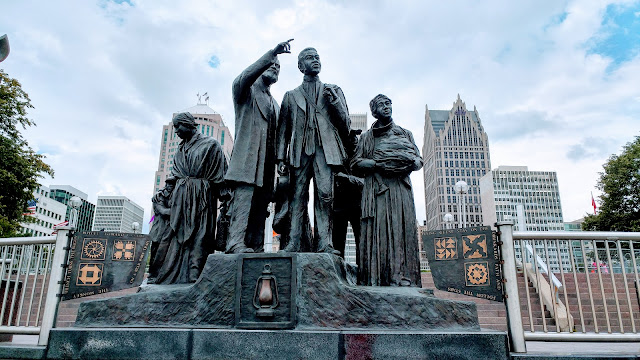Don’t Know Much about CRT, but I’ve been Listening to Black and Brown Voices
 |
| Underground Railroad Monument -- Detroit |
There
has been a lot of chatter about CRT (Critical Race Theory) lately. From what
I’ve been hearing, it’s a Communist plot designed to indoctrinate children and
sow discord in our country. I will admit that I’ve not read much about this
theory, which was developed by the Harvard Law School years ago to probe how
the legal code is applied to different racial/ethnic groups. While I’ve not
read much about CRT, I’ve gone through anti-racism training (it’s required by
my denomination for clergy standing). I’ve done a lot of reading about racism,
white supremacy, and white privilege, but I don’t remember encountering CRT as
part of the conversation. So, why has it suddenly become the focus of the
attention of politicians (primarily white)?
Apparently,
some in our country are feeling a bit uncomfortable because they are being
confronted by what we might call the underside of American history. As more
diverse voices are making themselves heard, we who are white are being
confronted by events and experiences that might call into question some of what
we’ve been taught about our country. For instance, we just celebrated
Independence Day, a day that celebrates the issuance of the Declaration of
Independence that declared that “all men are created equal.” Of course, that
wonderful phrase included only white males. It didn’t include black folks, most
of whom were slaves. It didn’t include indigenous peoples either. It also
didn’t include women who didn’t get the right to vote nationwide until the
1920s. Being reminded of this truth might be unsettling, but it needs to be
recognized because we’re still wrestling with what it means for all people to
be truly equal. Slavery is part of our past, whether or not our ancestors were
slaveowners. The policies of extermination of Native Americans are part of our
history and can’t be pushed to the side (the Trail of Tears is part of our
history). Manifest Destiny led to the expansion of the nation at the expense of
Native Americans and Mexicans. The overthrow of the Hawaiian monarchy is part
of our history. The same is true of the colonialist war in the Philippines. Learning
about these parts of our history might be unsettling, but it’s not divisive or
a communist plot. It’s simply looking at the complete story of our nation’s
history.
Now for
my final point, the black and brown voices I’ve been listening to. Although we
elected a Black man as President in 2008 and re-elected him in 2012 doesn’t
mean we live in a post-racial society. The legacy of slavery and other historic
events remain with us. Consider the wealth gap between white and black. To a
great extent that is rooted in government policies that date back to the
post-war era. VA loans and the GI bill funded education and home loans for
returning GIs. That is, white GIs who were able to purchase homes that
increased in value so that they could pass on an inheritance to their children.
Redlining also contributed to this wealth gap, preventing African Americans
with money down payment from purchasing homes in desirable neighborhoods. That
is part of our history that continues to be felt to this day.
Here is
my advice to my friends who are white, listen to your neighbors who are black
and brown. Listen to their stories and their concerns. Yes, the nation is
changing. It’s becoming less white. It’s also becoming less Christian as
immigrants from Asia, Africa, and the Middle East, along with their children
and grandchildren are adding to the broadening of our cultural and religious
milieu. Mosques and Temples are being built in our communities, along with
churches. Those churches might be filled with folks from all across the globe. Yes,
it won’t be long before white folk like me no longer make up more than 50% of
the population. That is already true of younger generations. We can resist, but
it won’t change the course of history. So, let us listen and learn so that we might
not only tolerate each other but perhaps become friends. That has nothing to do
with CRT. Diversity education in our schools, our businesses, and the military
isn’t designed to make white people feel guilty. It’s designed to open spaces
in the nation for the increasingly diverse population. Knowing about the
unsavory parts of our history is part of the process of listening to those
voices that too often have been marginalized in this country. While learning history is helpful, the most important thing is to listen to
black and brown folks. That requires relationships with people that might not
look like you. Then change can begin to happen in this nation, so that we can inhabit the promise of the Declaration of Independence.
Comments